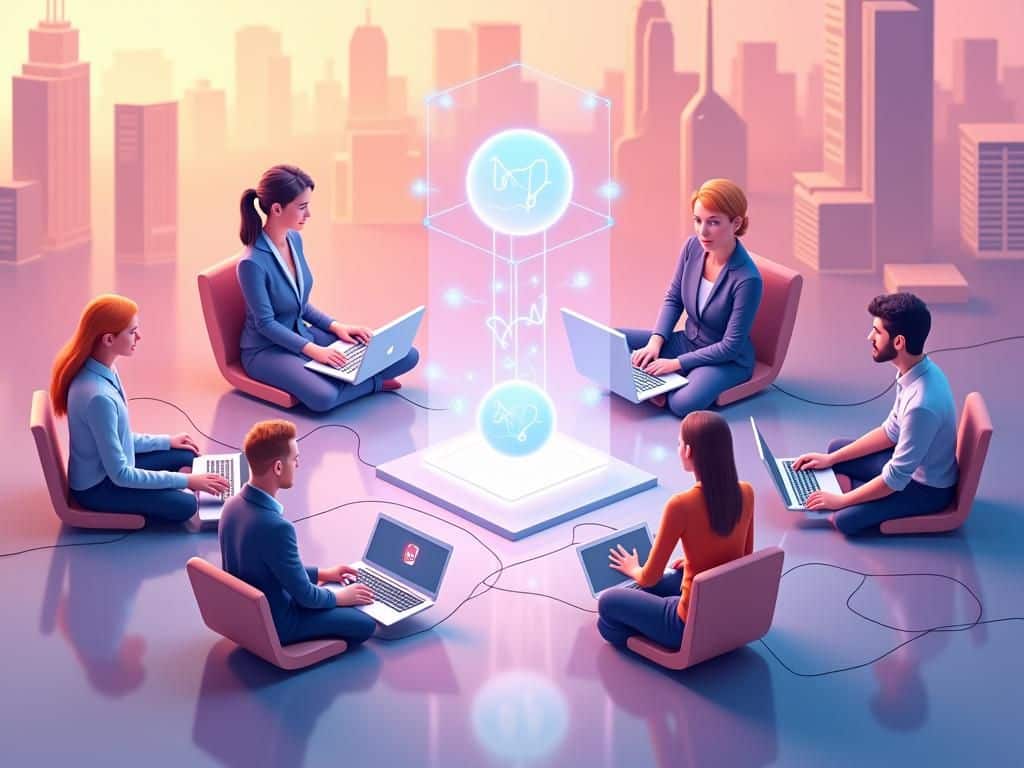As the gig economy continues to expand, gig worker collective bargaining has become a crucial aspect of ensuring fair labor practices and protecting the rights of workers in the industry. With the rise of decentralized autonomous organizations (DAOs), a new era of collective bargaining has emerged, empowering gig workers to negotiate better working conditions, wages, and benefits.
Introduction to Collective-Bargaining DAOs
A DAO is a blockchain-based organization that operates autonomously, allowing members to make decisions and take actions without the need for a central authority. In the context of gig workers, collective-bargaining DAOs provide a platform for workers to come together, share resources, and negotiate with platforms and clients. This approach has the potential to level the playing field, giving gig workers more bargaining power and better working conditions. To learn more about the intersection of blockchain and labor rights, visit Discover more on TokenRobotic.
Benefits of Collective-Bargaining DAOs for Gig Workers
Collective-bargaining DAOs offer several benefits for gig workers, including:
- Improved working conditions: By collectively negotiating with platforms and clients, gig workers can push for better working conditions, such as fair pay, safe working environments, and access to benefits.
- Increased bargaining power: Collective-bargaining DAOs give gig workers a stronger voice in negotiations, allowing them to demand better treatment and more favorable contracts.
- Enhanced transparency and accountability: DAOs operate on blockchain technology, ensuring that all transactions and decisions are transparent, tamper-proof, and accountable to members.
- Access to resources and support: Collective-bargaining DAOs can provide gig workers with access to shared resources, such as legal support, training, and networking opportunities.
These benefits have the potential to significantly improve the lives of gig workers, who often face precarious working conditions and limited access to resources. For more information on the impact of blockchain on labor markets, visit TokenRobotic.
How Collective-Bargaining DAOs Work
Collective-bargaining DAOs typically operate on a blockchain platform, such as Ethereum or Polkadot, and use smart contracts to facilitate decision-making and negotiations. The process usually involves the following steps:
- Gig workers join the DAO by purchasing tokens or contributing resources, such as time or expertise.
- Members participate in decision-making processes, such as voting on proposals or electing representatives.
- The DAO negotiates with platforms and clients on behalf of its members, using collective bargaining power to secure better working conditions and contracts.
- The DAO distributes benefits and resources to its members, such as revenue shares or access to training programs.
According to a report by McKinsey, the use of blockchain technology can increase transparency and efficiency in labor markets. Similarly, a study by Harvard University found that collective bargaining can lead to improved working conditions and higher wages for workers.
Challenges and Limitations of Collective-Bargaining DAOs
While collective-bargaining DAOs offer many benefits, they also face several challenges and limitations, including:
- Scalability: Collective-bargaining DAOs can be difficult to scale, particularly in industries with large numbers of gig workers.
- Regulatory uncertainty: The regulatory environment for collective-bargaining DAOs is still evolving, and there may be uncertainty around issues such as taxation and labor laws.
- Coordination: Collective-bargaining DAOs require coordination and cooperation among members, which can be challenging, particularly in decentralized organizations.
- Security: Collective-bargaining DAOs may be vulnerable to security risks, such as hacking and smart contract exploits.
Despite these challenges, collective-bargaining DAOs have the potential to transform the gig economy and improve the lives of workers. For more information on the potential of blockchain to disrupt traditional labor markets, visit Discover more on TokenRobotic.
Real-World Examples of Collective-Bargaining DAOs
Several collective-bargaining DAOs have already been established, including:
- Crypto Union: A DAO that represents the interests of cryptocurrency traders and investors.
- Freelance Union: A DAO that supports freelance workers in negotiating better contracts and working conditions.
- Gig Workers Co-op: A DAO that provides resources and support to gig workers, including access to benefits and training programs.
These examples demonstrate the potential of collective-bargaining DAOs to empower gig workers and improve their working conditions. According to a report by PwC, the use of blockchain technology can increase trust and transparency in labor markets.
Future of Collective-Bargaining DAOs
The future of collective-bargaining DAOs looks promising, with the potential to transform the gig economy and improve the lives of workers. As the technology continues to evolve, we can expect to see:
- Increased adoption: More gig workers and platforms will adopt collective-bargaining DAOs, leading to greater scalability and impact.
- Improved regulation: Regulatory frameworks will develop to support the growth of collective-bargaining DAOs, providing clarity and certainty for members.
- Enhanced security: Collective-bargaining DAOs will prioritize security, implementing robust measures to protect members and their assets.
- Expanded services: Collective-bargaining DAOs will offer a wider range of services, including training, benefits, and support programs for gig workers.
For more information on the future of work and the potential of blockchain to disrupt traditional labor markets, visit TokenRobotic. According to a study by Stanford University, the use of blockchain technology can lead to increased efficiency and productivity in labor markets.
In conclusion, collective-bargaining DAOs have the potential to revolutionize the gig economy, empowering workers to negotiate better working conditions, wages, and benefits. While there are challenges and limitations to overcome, the benefits of collective-bargaining DAOs make them an exciting and promising development in the world of work. To learn more about the intersection of blockchain and labor rights, visit Discover more on TokenRobotic. Join the conversation and explore the potential of collective-bargaining DAOs to transform the future of work.
Take the first step towards a more equitable and just labor market – visit TokenRobotic today and discover the power of collective-bargaining DAOs for gig workers.

